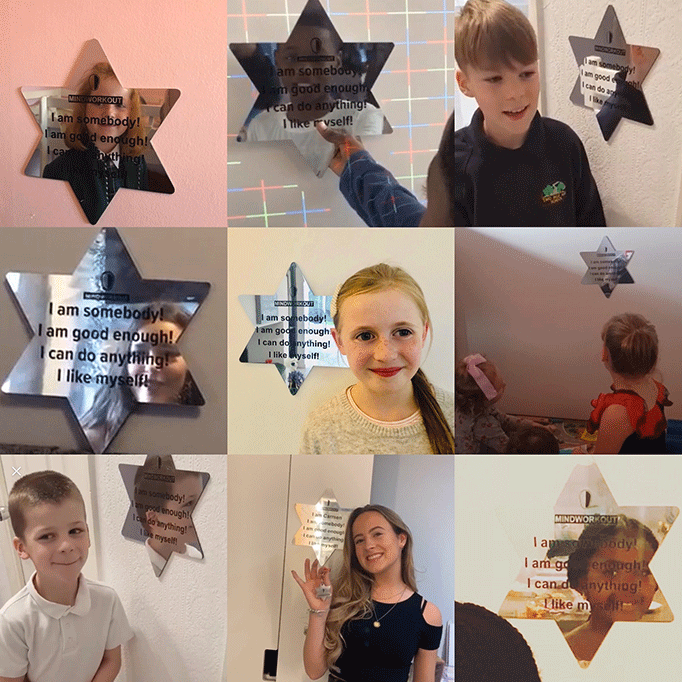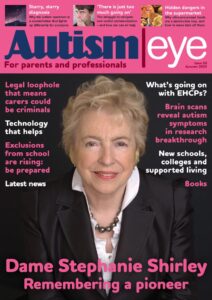The Confidence Star is like anti-virus software for the mind.
Twice a day keeps negative thoughts away. Try it – you’ve got nothing to lose but so much to gain.
Our children’s mental health
As parents, we spend so much time choosing the right school, making sure our children get the best education. But what about their mental health?
Children as young as five are reported to be experiencing anxiety and depression. Nine out of every 10 people with autism will experience depression.
The Confidence Star is a fantastic way to start a conversation with your child. It brings to the surface any fears, worries or negative thoughts they might be experiencing that you are not aware of.
Take Action with The Confidence Star, proudly supporting Action for Children.
The psychology behind the Confidence Star
The self-concept is one of the biggest discoveries in human psychology.
We carry around with us a mental blueprint, or picture, of ourselves. This self-concept is built from our own beliefs about ourselves. In early childhood, we begin to form an idea of who we are and what we can do, based on our previous successes and failures. We mentally construct a ‘self’ (or a picture of a self). Once an idea or belief about ourselves goes into this picture it becomes ‘true’ as far as we are concerned.
Therefore, the phrase “that’s just the way I am” is such a powerful statement. It lets you believe that you can’t be more.
How you think of yourself
How you think about yourself is very complex, and there are three parts: self-ideal, self-image and self-esteem.
Self-ideal: This is the person that you want to be. It’s the way you’d like to be in your ideal world. Often you think you have no control over who you are or who you can become. When you get stuck in a mental rut and make no attempt to get unstuck, you will tell yourself there’s nothing you can do.
Self-image: This is your expectation of yourself, it’s the way you see yourself and the way you think about yourself. Often called your inner mirror, it’s the picture you hold of yourself. You refer to it for clarification on how well you believe you will perform in each area of your life.
Self-esteem: This is how you feel about yourself. It’s the emotional part of your personality and it’s the foundation to all happiness in life. It affects everything! Think of your self-esteem as the power source to your personality, it makes you more confident, self-assured, enthusiastic and puts a spring in your step. When you begin to work on your self-esteem you will become a confident person. You will have an invisible shield that will protect you from negative self-talk and outside criticism.
Start sending new positive messages to the mind with the Confidence Star
Your subconscious mind is extremely powerful and the way you can override negative thoughts is to think positive thoughts. The way you do this is by saying every morning, and as many times as you can:
“I’m somebody, I’m good enough, I can do anything, I like myself”
How the Confidence Star works
This 15-second exercise can completely change the way you think about yourself and the way you talk about yourself.
Look at this like anti-virus software that you are installing into your mind.
This software works like a shield, it protects you from any internal and external criticism.
Parent peace of mind
I have genuine peace of mind that I am building my children’s confidence and that I am preparing them for their future by teaching them compassion, kindness and self-love.
One in four adults suffers from depression! This star will help work against the feeling of “I’m not good enough”.
Take action today with the Confidence Star, proudly supporting Action for Children.
The definition of confidence means feeling sure of yourself and your abilities — not in an arrogant way, but in a realistic, secure way.
Author and social justice activist Joel Olson says: “What you say about yourself has a greater impact on you than anything anybody else says about you.”
Many people are overly critical of themselves, saying such things as: “I’m so clumsy”, “I can’t do anything right”, “I’m so overweight that I’ll never get back into shape”, or “I never get any good breaks”.
Those words sink into our minds. One of the best ways to break free from such negative self-talk is simply by speaking words of victory. Every day, look in the mirror and declare, “I am somebody, I am good enough, I like myself”.
My journey
I have been on a personal development journey for the past 16 years. I’ve read more than 100 books on psychology, philosophy, quantum physics theory on mindset, human behaviour, communication, business and personal success.
What I’ve learned first-hand is that you can build confidence the same way a dancer builds a muscle, through repetition and focused attention. You can learn how to be an outstanding parent by learning step by step the same way you would learn the choreography on Strictly Come Dancing.
Parents have the power to shape a child’s life
My name is Ife Thomas and I’m a mother of two. When I found out I was pregnant, one of my first thoughts was: “I need to make sure I give them everything I had and much more.”
When my first son was 24 months old he was diagnosed with autistic spectrum disorder.
I was told that he will struggle for the rest of his life.
Autism is a neural development disorder that affects one in every 100 children in the UK. It is characterised by significant difficulties in social and non-verbal communication, with repetitive and restrictive behaviour patterns.
I read an article from the National Autistic Society that a person with autism is 28 times more likely to experience depression and suicidal thoughts.
This is what triggered my need to find out how to make sure that I did everything possible to support my son’s mental health to ensure he would grow up liking himself and believing in himself. I needed to find a way to install in his mind self-esteem and self-confidence.
So I created the Confidence Star.
Not only survive, but thrive
My thoughts were that if I can sleep at night knowing that if anything happened to me he would not only survive but thrive in this world, then I could have peace of mind.
I started reading and learning everything I could find on how to build confidence. There is so much good information out there on how to raise happy, confident kids – so much that it’s overwhelming. I have read more books than I can remember and have attended fantastic seminars all over the world.
It’s taken me years to get through all the information and I’ve been trying and testing it out on my own children.
Three groups of people
I spend most of my time working with three groups of people.
The first group: parents who have a child with special educational needs who are concerned their child may lack confidence.
The Second group: parents who want to help their child build confidence and gain more self-belief.
The Third group: professionals who work directly with people with mental health issues.
Every 11 minutes a person under the age of 25 takes their own life by suicide.
Some studies show that almost one in four young people will experience depression before they are 19 years old.
As parents we are under incredible pressure to live up to that perfect stereotype of having everything figured out at all times. Sometimes it’s exhausting running around trying to do everything for everyone. It feels like a never-ending flow of things to do and organise.
Well, if there is only one thing you have time to do, I highly recommend the Confidence Star.
Preparation: in the morning before going out into the world and once again in the evening before going to sleep.
Unresolved feelings
The field of psychotherapy is built around helping people deal with unresolved feelings of anger, guilt, and resentment.
You develop negative emotions as a result of two experiences that happen to you early in life. Children up to the age of six are open and vulnerable to the influences of the important people in their lives. They have no capacity to discriminate between true and false evaluations and criticisms.
The child’s mind is like wet clay upon which their parents and siblings write and leave marks. The more intense the emotion, the deeper the groove.
When you grow older and develop the powers of discrimination you can consider the source of negative input. If someone criticises you or disagrees with you, you can stand back and judge whether the assessment is valid or not. You can choose to accept or ignore what you consider to be helpful and reject the rest.
However, when you are a child you have no such ability because you are still in the process of learning who you are. You are like a little sponge: you absorb the evaluations of the important people around you as if they were telling the absolute truth, as if they were actually in a position to know your true character and capabilities.
You accept what they say
The more you value their love and respect, the more you accept what they say about you as a valid assessment of your character and worth. Once you accept something as true about yourself you begin to see yourself by the light of that belief.
Your mind attempts to work with you by validating what you decided is correct about you. It then sorts and divides your perceptions. This causes you to look for examples that prove your beliefs, while simultaneously causing you to ignore experiences that contradict it.
If you are told that you are a bad girl or that you are a naughty boy and can’t be trusted, or that you are a liar, you will start to believe that these criticisms are solid facts about your basic personality.
No instruction manual for children
When you buy a new computer, car or camera, it comes with a detailed instruction manual. There is no guesswork required: you’re told exactly what to do.
But when you bring a child home from the hospital – and prepare for raising him or her, which is undoubtedly one of the most important tasks of your life, you’re pretty much on your own.
If you’re like so many of the parents I talk to, raising your children into happy, confident, productive adults is your number one goal.
And, 20 or 30 years from now, the last thing you want is to look back and regret that you didn’t spend enough time with your children, or didn’t do a good enough job raising them.
While it’s perfectly natural to question how well you’re doing, especially as your kids get older and begin having problems in school, at work, and in relationships…
The Confidence Star is the answer, the first step to self-love and self-belief.

















